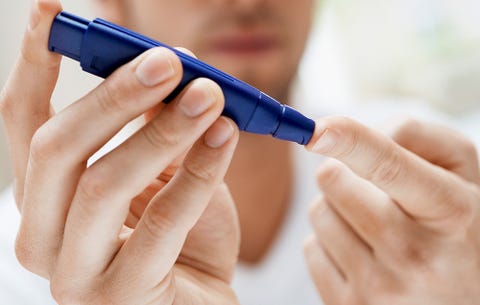
Apple cider vinegar is something of a jack-of-all-trades in the wellness world. Often referred to as ACV, apple cider vinegar is basically apple cider with yeast added to it to start the fermentation process. Recently, health blogs and websites have started claiming that ACV can do everything from improving your digestion to curing your dandruff to helping you lose weight. Name a health problem, and ACV is likely to come up as a natural cure-all for it.
But while all those rave reviews sound promising, science doesn’t exactly tell the same story. There hasn’t been much research on these purported benefits of apple cider vinegar (especially in humans), so there’s not much proof about what it can and can’t do.
That said, there are some small-scale studies that have pointed to the potential benefits of apple cider vinegar— provided you’re using it correctly (i.e., you’re not taking too much or drinking it straight, which can wreak havoc on your teeth or cause diarrhea). Here’s what you need to know.

shutterstock
High blood sugar has been linked to carb and sugary food cravings, and “there’s some preliminary research to show that apple cider vinegar may help control post-meal spikes in blood sugar levels,” Amy Gorin, M.S., R.D.N., owner of Amy Gorin Nutrition in the New York City area, tells MensHealth.com. One study found that when two teaspoons of apple cider vinegar were taken alongside carb-heavy meals, blood sugar levels stabilized.

Getty Images
The blood sugar benefits of ACV can have an impact beyond cravings, too. “Because apple cider vinegar could help control spikes in blood sugar levels, it could be helpful for people with diabetes,” says Gorin. “It’s believed that the acetic acid in apple cider vinegar could slow down how quickly complex carbohydrates are converted in the bloodstream.” Research also suggests that people who have insulin resistance or prediabetes can especially benefit from these effects, compared to people with normal blood sugar levels.
Another study found that diabetes patients who took two tablespoons of ACV with one ounce of cheese before bed “decreased their fasting blood sugar [their blood sugar levels in the morning] by four percent,” functional dietitian Ryan Whitcomb, M.S., R.D., C.L.T., owner of GUT RXN Nutrition, tells MensHealth.com. However, he notes that the protein in the cheese might also be partly responsible, so it can’t be concluded that ACV alone helped lower blood sugar levels.
Of course, type 2 diabetes is a serious disease, so talk to your doc about dietary changes like adding ACV to your routine, says Gorin (especially if you’re taking other medications).

Getty Images
“ACV baths may be helpful in treating atopic dermatitis [eczema] because they acidify the skin, providing anti-microbial properties,” says Whitcomb.
That doesn’t mean, however, that you should apply straight ACV to your skin, as not diluting ACV can potentially result in burns. Instead, the Dermatology Nurses’ Association recommends adding about three to four cups of ACV to half a bathtub of water, then soaking for 10 minutes.

Getty
Apple cider vinegar is most often cited as a weight loss tool, and there’s some evidence to suggest that it may be helpful in that regard. The acetic acid in ACV may help your body use fat for energy instead of storing it, says Whitcomb.”One study looked at the use of ACV with a calorie-restricted diet for 12 weeks, and those in the ACV group versus the control group (no ACV) significantly reduced their body weight, BMI, hip circumference, visceral adiposity [belly fat], and appetite scores,” says Whitcomb.
That said, there are limitations to current research on weight loss and apple cider vinegar, says Whitcomb. In the one above, for instance, “there were only 39 people in the study, preventing us from extrapolating the results to the population as a whole,” he says. It’s also worth noting that both the control group and the ACV group were put on diets with a 250-calorie deficit. “Did the calorie restriction lead to the results, did the ACV, or was it a combination of both? It’s hard to say,” says Whitcomb.

Getty Images
“Apple cider vinegar can be useful for regulating stomach acid,” functional nutritionist Brigid Titgemeier, M.S., R.D.N., L.D., tells MensHealth.com. This is particularly true if you have low stomach acid, which can potentially cause acid reflux. “When stomach acid is low, it causes pH levels to rise in the stomach, which leads to a gut environment where bacteria can flourish, creating bacterial imbalance,” Titgemeier says. ACV may benefit digestion by regulating pH levels in the stomach.

Amazon
Bragg
amazon.com
$13.00
SHOP NOW
Bottom line: Apple cider vinegar can play a role in healthy lifestyle changes, but until more research is published, the jury’s out on exactly how strong its benefits are. But if you want to try it, “I recommend a range of one to two tablespoons with eight ounces of water before meals, and I often encourage people to ramp up slowly,” says Titgemeier. She recommends using organic raw apple cider vinegar, like Bragg USDA Organic Raw Apple Cider Vinegar.
It’s also important to remember that apple cider vinegar isn’t a cure-all. “Apple cider vinegar isn’t a magic fix all by itself—it may help support other healthy behaviors,” says Gorin.
This is especially true if you’re hoping to manage your diabetes or lose weight. “Diet, lifestyle [changes], and physical activity are the best tools to use in those instances,” says Whitcomb. “ACV can fit in nicely, but it’s not the only change one needs to make.”
Source: Read Full Article
